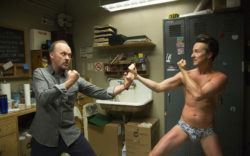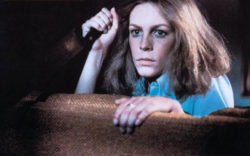THE GRAND BUDAPEST HOTEL (R) There is a moment in writer/director Wes Anderson’s latest movie, The Grand Budapest Hotel, that succinctly crystallizes his humanity and kinship with earlier directors Jean Renoir and Franois Truffaut, two major influences on Anderson’s approach to cinema. The Grand Budapest Hotel’s loyal concierge, M. Gustave H. (Ralph Fiennes), is serving time in prison, framed for the killing of one of his seasonal elderly guests (and lover), Mme. D (Tilda Swinton). Gustave pushes his cart of mush to each cell offering food to the other inmates. Most of the steely prisoners glower at him and refuse, perplexed by Gustave’s ability to maintain some kind of civility in a place so cold and violent. One towering, impressively imposing prisoner with a scar across his hardened face, however, does accept the food. In that moment, the prisoner subtly acknowledges Gustave’s attempt to preserve the notion that they are not animals (regardless of their crimes), but simply men. And with the proper instruction and guidance, most of them (there are always exceptions, such as Willem Defoe’s nasty, murderous thug of a character, Jopling) could be men of taste and refinement. Much like Colonel Blimp from the masterful 1943 Powell and Pressburger movie The Life and Death of Colonel Blimp, who naively believed that good manners were integral to proper battlefield conduct against a monstrous opponent, Gustave has wrapped himself up in an illusion simultaneously touching, ridiculous and heroic. But if done with appropriate style, the illusion can become believable and worth devotion.
If you have seen any of Anderson’s movies—particularly Rushmore, The Royal Tenenbaums, The Life Aquatic with Steve Zissou and Moonrise Kingdom—you no doubt have strong feelings about them. He is not a filmmaker who elicits a passive reaction. His work, at least from Rushmore on, has plunged into an increasingly hermetic, highly-stylized world of refinement, comedic slapstick and heartfelt loneliness. The Grand Budapest Hotel is Anderson’s most eccentric and fully realized work yet, playing like a live-action cartoon channeled through the influences of Renoir and Truffaut, as well as Ernst Lubitsch, Fellini and the Archers. Ultimately, it’s Anderson’s own fully realized voice that shines through. The movie is immaculately and impressively designed, much like the pastries that the young Agatha (Saoirse Ronan) delicately constructs, to the delight of everyone, including the baddies. But what makes The Grand Budapest Hotel resonate on a deeper level is its heart. Its surface may gleam like candy, but the absurdist fable told underneath is one of playful insight and warmth, peopled with characters who understand that it’s worth fighting for grand illusions in the shadow of ruthlessness and certain defeat.
Like what you just read? Support Flagpole by making a donation today. Every dollar you give helps fund our ongoing mission to provide Athens with quality, independent journalism.










